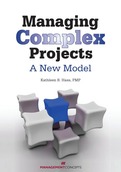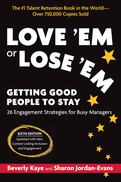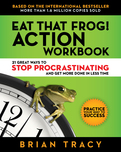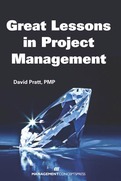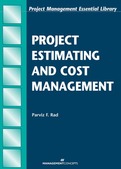Search Results: "building the future"
Results 1021-1026 of 1218
For organizations to thrive, indeed to survive, in today's global economy, we must find ways to dramatically improve the performance of large-scale projects. Applying the concepts of complexity theory can complement conventional project management approaches and enable us to adapt to the unrelenting change that we ignore at our own peril.
Managing Complex Projects: A New Model offers an innovative way of looking at projects and treating them as complex adaptive systems. Applying the principles of complexity thinking will enable project managers and leadership teams to manage large-scale initiatives successfully.
• Explore how complexity thinking can be used to find new, creative ways to think about and manage projects
• Diagnose complexity on a wide range of projects — from small, independent, short projects to highly complex, longer projects
• Understand and manage the complexity of the business problem, opportunity, solution, and other dimensions that come into play when managing large-scale efforts
Use the Project Complexity Model to determine the most effective approach to managing all aspects of a project based on the level of complexity involved.
Managing Complex Projects: A New Model offers an innovative way of looking at projects and treating them as complex adaptive systems. Applying the principles of complexity thinking will enable project managers and leadership teams to manage large-scale initiatives successfully.
• Explore how complexity thinking can be used to find new, creative ways to think about and manage projects
• Diagnose complexity on a wide range of projects — from small, independent, short projects to highly complex, longer projects
• Understand and manage the complexity of the business problem, opportunity, solution, and other dimensions that come into play when managing large-scale efforts
Use the Project Complexity Model to determine the most effective approach to managing all aspects of a project based on the level of complexity involved.
This sixth edition of the number one bestselling employee retention book in the world (over 800,000 copies sold) puts a new emphasis on diversity and inclusion but keeps the same appealing format: twenty-six simple strategies from A to Z.
Despite booms and busts, technology advances, talent wars, layoffs, and even a global pandemic, people want what they've always wanted. Employees want—and now expect—meaningful work, supportive bosses, regular recognition, and a chance to learn and grow. And managers want their amazing people to stay—for at least a little while longer. For two decades, this Wall Street Journal bestseller—over 800,000 sold—has offered twenty-six simple strategies, from A to Z, that managers can use to address their employees' real concerns and keep them engaged.
The authors have gone over every word of the previous edition, revising, updating, and streamlining. This edition includes a timely focus on diversity and inclusion in every chapter. For example, chapter 6 focuses on family. Different cultures view family responsibilities differently, so the authors address how to take that into consideration when a treasured employee asks for extended leave to care for a grandparent. And a new section called “Conversations That Count” offers discussion questions for sparking deeper conversation around the topics in the book.
This new edition will ensure that Love 'Em or Lose 'Em will continue to help managers all over the world create a supportive workplace culture so they can fight burnout and keep the people they can least afford to lose.
Despite booms and busts, technology advances, talent wars, layoffs, and even a global pandemic, people want what they've always wanted. Employees want—and now expect—meaningful work, supportive bosses, regular recognition, and a chance to learn and grow. And managers want their amazing people to stay—for at least a little while longer. For two decades, this Wall Street Journal bestseller—over 800,000 sold—has offered twenty-six simple strategies, from A to Z, that managers can use to address their employees' real concerns and keep them engaged.
The authors have gone over every word of the previous edition, revising, updating, and streamlining. This edition includes a timely focus on diversity and inclusion in every chapter. For example, chapter 6 focuses on family. Different cultures view family responsibilities differently, so the authors address how to take that into consideration when a treasured employee asks for extended leave to care for a grandparent. And a new section called “Conversations That Count” offers discussion questions for sparking deeper conversation around the topics in the book.
This new edition will ensure that Love 'Em or Lose 'Em will continue to help managers all over the world create a supportive workplace culture so they can fight burnout and keep the people they can least afford to lose.
The workbook version of this international bestseller guides you through getting more of the important things done. You'll stop procrastinating and start eating those frogs in no time!
There's an old saying that if the first thing you do each morning is eat a live frog, you'll have the satisfaction of knowing you're done with the worst thing you'll have to do all day. For Brian Tracy, eating a frog is a metaphor for tackling your most challenging task—but also the one that can have the greatest positive impact on your life.
Eat That Frog! shows you how to organize each day so you can zero in on these critical tasks and accomplish them efficiently and effectively. The core of what is vital to effective time management is: decision, discipline, and determination. This workbook puts the ideas of the original book into action. By following the same twenty-one-chapter format as the book, each chapter includes exercises for you to reflect on your own habits. You'll also learn through the experience of a narrative character who is struggling with procrastination in her work and home life and uses Eat That Frog! to improve her time management performance.
There's an old saying that if the first thing you do each morning is eat a live frog, you'll have the satisfaction of knowing you're done with the worst thing you'll have to do all day. For Brian Tracy, eating a frog is a metaphor for tackling your most challenging task—but also the one that can have the greatest positive impact on your life.
Eat That Frog! shows you how to organize each day so you can zero in on these critical tasks and accomplish them efficiently and effectively. The core of what is vital to effective time management is: decision, discipline, and determination. This workbook puts the ideas of the original book into action. By following the same twenty-one-chapter format as the book, each chapter includes exercises for you to reflect on your own habits. You'll also learn through the experience of a narrative character who is struggling with procrastination in her work and home life and uses Eat That Frog! to improve her time management performance.
Learn from Other Projects to Avoid Pitfalls on Your Projects!
Projects fail at an alarming rate, whether they are information technology, training, construction, or policy development projects. No matter the focus, each year we experience an abundance of challenged projects that either require super-human effort to resuscitate or die an untimely death.
Great Lessons in Project Management is a treasure trove of lessons learned from troubled projects—and from projects that went well. This collection of stories describes the events surrounding a particular challenge a project manager faced or a tool that another used effectively. Project managers of all types of projects can draw on these stories to validate their own good practices and to avoid the pitfalls so many have encountered on their projects.
Projects fail at an alarming rate, whether they are information technology, training, construction, or policy development projects. No matter the focus, each year we experience an abundance of challenged projects that either require super-human effort to resuscitate or die an untimely death.
Great Lessons in Project Management is a treasure trove of lessons learned from troubled projects—and from projects that went well. This collection of stories describes the events surrounding a particular challenge a project manager faced or a tool that another used effectively. Project managers of all types of projects can draw on these stories to validate their own good practices and to avoid the pitfalls so many have encountered on their projects.
Blaze Your Own Trail
2020
A modern, feminist take on the classic choose-your-own-journey book, inspiring readers to embrace the fact that there is no singular right path—just your own!
So many women enter their adult lives believing that they should know where they are going and how to get there. This can make life decisions feel intimidating and overwhelming. While some choices that lie ahead are fairly predictable, such as those surrounding career, partnership, and motherhood, the effects of these choices can lead to more complicated and unexpected turns that are seldom discussed.
Rather than suggesting a rule book, Rebekah Bastian, vice president at Zillow and recognized thought leader, inspires you to Blaze Your Own Trail. “I have the benefit of being a living example of crooked paths, magnificent screw-ups, and shocking successes,” she writes. Through storylines and supportive data that explore workplace sexism, career changes, marriage, child-rearing, existential crises, and everything in between, you will learn to embrace and feel less alone in your own nonlinear journey. Even better, you can turn back decisions and make different ones. Blaze Your Own Trail includes nineteen possible outcomes and many routes to get there. You will find that you have the strength to make it through any of them.
So many women enter their adult lives believing that they should know where they are going and how to get there. This can make life decisions feel intimidating and overwhelming. While some choices that lie ahead are fairly predictable, such as those surrounding career, partnership, and motherhood, the effects of these choices can lead to more complicated and unexpected turns that are seldom discussed.
Rather than suggesting a rule book, Rebekah Bastian, vice president at Zillow and recognized thought leader, inspires you to Blaze Your Own Trail. “I have the benefit of being a living example of crooked paths, magnificent screw-ups, and shocking successes,” she writes. Through storylines and supportive data that explore workplace sexism, career changes, marriage, child-rearing, existential crises, and everything in between, you will learn to embrace and feel less alone in your own nonlinear journey. Even better, you can turn back decisions and make different ones. Blaze Your Own Trail includes nineteen possible outcomes and many routes to get there. You will find that you have the strength to make it through any of them.
Improve the accuracy of project estimates and make better in-progress modifications by following the discipline-independent approach mapped out in this book. Learn the best ways to apply new tools, including a breakdown structure for both work and resources and proven estimating models. In addition, you'll gain insights into best practices for progress monitoring and cost management, as well as for dealing effectively with external projects.


